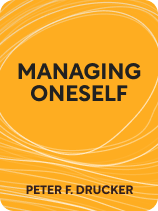

This article is an excerpt from the Shortform book guide to "Managing Oneself" by Peter F. Drucker. Shortform has the world's best summaries and analyses of books you should be reading.
Like this article? Sign up for a free trial here .
Are you entertaining the idea of starting a second career? What are the advantages of having two careers?
A second career is a career you initiate around the midpoint in your working life. According to Peter Drucker, there are two key advantages of starting a second career: 1) avoiding career stagnation, and 2) having an extra opportunity for professional realization.
Let’s explore Drucker’s notion of a second career, its advantages, and how to start it.
Your Second Career
Your second career could be a complete switch in careers or a gradual transition towards something more suited to you. Drucker states that those who have a successful second career are the natural leaders who’ve mastered the principles of self-management.
| The Second Career and “The Great Resignation” Drucker’s concept of the second career is one that played out in “The Great Resignation,” a movement caused by the Covid-19 pandemic. According to surveys from 2021, 50% of the U.S. workforce wanted to make a career change, and at the peak of this trend, approximately four million Americans quit their jobs every month. While some of these people cited working conditions such as greater flexibility in other positions as the main reason why they quit, 61% of employees who quit said that a newly-gained industry-recognized credential was part of the reason they got a new job. This indicates that they were switching careers or looking for a more advanced position within the same field, both of which come under Drucker’s definition of a second career. The same survey found that 78% of those who changed their jobs were happier in their new role, which upholds Drucker’s assertion that a second career is generally a better fit than your first. |
The Advantages of a Second Career
Drucker says that there are several advantages to having a second career. First, it helps you avoid career stagnation. If you’ve been working the same job and industry for 20 years, you may not be inspired by the idea of continuing on that path for the next 20 years. Changing careers presents a fresh start and a new challenge.
Second, it can give you another pathway to success. In today’s knowledge economy, Drucker underlines, we increasingly judge people by their achievements. If your first career hasn’t been successful, having a backup option presents a new opportunity to achieve.
| Further Advantages of a Second Career Drucker’s last reason to consider a second career—that it will help you be seen as successful—is one that relies heavily on the notion that you can succeed only through your career, rather than in other areas of your life. It also assumes that a career is something you can either “succeed” or “fail” at, which is quite an extreme view of careers as a whole. Regardless, there are reasons why a second career may be beneficial, including the possibility of a fresh start as Drucker suggests. Other reasons include that a second career is possibly more adapted to the current job market. Furthermore, a second career gives you the opportunity to pursue a role that you’re actually interested in. Your first career may have been dictated by financial constraints or family expectations, whereas your second career could reflect a genuine interest. Finally, you could also earn more money from a second career, if you switch to a job in a field with higher salaries. This could be not just useful but necessary, as longer life expectancy has increased the cost of retirement. |
How Can You Start Your Second Career?
One approach to starting a second career is to pivot from the path that you’re on to use your skills in a different industry. For example, if you previously worked in human resources and were responsible for recruitment, you could pivot and start to work as a headhunter.
Drucker’s other path to a second career is to run a career or activity parallel to your main job and slowly switch from one to the other. For instance, you may have a main job as a sales account manager and have a secondary source of income renting out a property as a vacation home. As you become more proficient at managing the vacation home, other people may ask you to manage their properties, too, and you can slowly transition into a property management role.
| How to Switch Careers Drucker outlines some general pathways to switch from one career to another but doesn’t take into account the practical considerations of a career change. Two of the most common constraints when changing careers are time and money. For example, it’s common to take a pay cut when switching careers, as you probably have less experience in the new field. In this regard, Drucker’s pathway of a slow career transition may be best because the second career starts out as a secondary income, and you can switch to it full-time when you’re sure you can make a living. However, working both a job and a side job presents a constraint on your time, and it could detract from time spent with family or pursuing other interests. If you’re looking to preserve your work-life balance and could afford a pay cut, Drucker’s first plan of jumping from one career path to another may be better. |

———End of Preview———
Like what you just read? Read the rest of the world's best book summary and analysis of Peter F. Drucker's "Managing Oneself" at Shortform .
Here's what you'll find in our full Managing Oneself summary :
- Why the secret to building a successful career is managing yourself
- How to build a rewarding career where you can thrive
- How to have a second career that’s even better than your first






